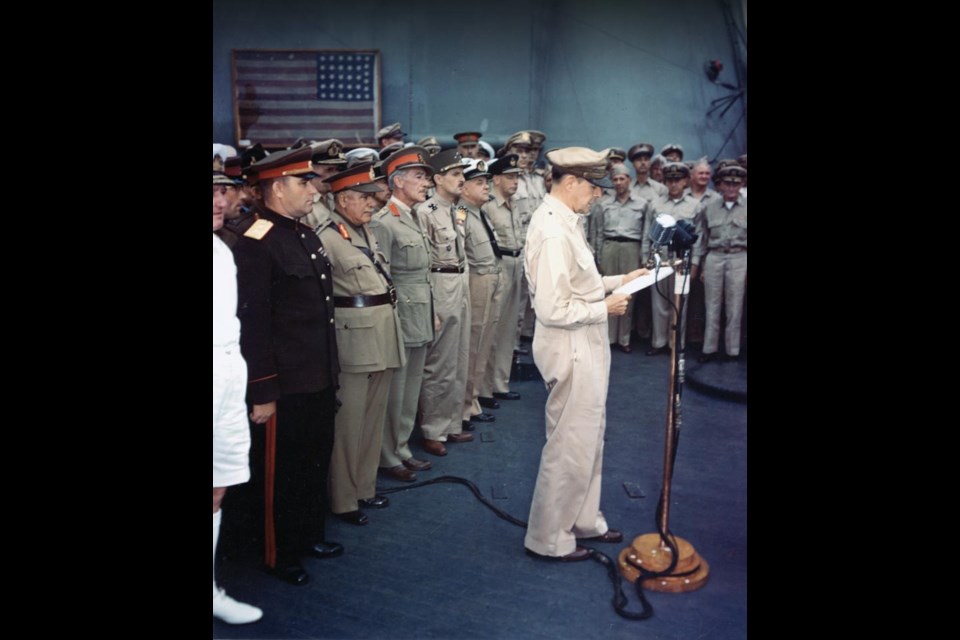MOOSE JAW — Japan’s unconditional surrender to the Allies during a formal ceremony on Sept. 2, 1945, was “the greatest drama in modern times,” a Times-Herald editorial stated, especially since the event was broadcast live.
“It would have been a dramatic event — the complete capitulation of a modern military power — in any circumstance, but when, through the medium of radio, the entire world listened in on the event, there was a theatrical aspect to this making of history,” said the editorial 80 years ago.
The formal surrender officially ended the Second World War, a conflict that killed roughly 85 million people, 75 per cent of whom were civilians. During the war, 1.1 million Canadians and Newfoundlanders served, with 45,000 killed and 55,000 wounded.
Victory over Japan
Japan had announced on Aug. 15, 1945 — VJ-Day — that it was quitting the war, which prompted jubilant celebrations in the same vein as when Germany officially surrendered on May 8, 1945, or VE-Day.
Moose Jaw held two celebrations to commemorate VJ-Day, one that was spontaneous and one that was official.
A Times-Herald article from August 1945 reported that the spontaneous celebrations on Aug. 15 saw residents “ready to ‘whoop it up,’ to make a noise and let go their feelings at the end of a long and terrible war.”
The official event on Aug. 16, meanwhile, was a national holiday, which included church services, a parade and a street dance. There was also plenty of enthusiastic noise — motorists honking horns, children using instruments and other objects, and people shouting from buildings — throughout the evening.
“The rejoicing at the close of the 1939-45 war was kept up until the early hours of Wednesday morning, many being loath to call it a day and go home to bed,” the article added.
A solemn event
The editorial commended U.S. Gen. Douglas MacArthur, the supreme commander of the Allied forces in the Pacific, for being the author of the ceremony and an actor in it. Moreover, the article praised him for how he arranged his supporters and the surrender table on the deck of the battleship USS Missouri, along with his “significantly phrased epilogue.”
“… it was most evident that he was making the event solemnly impressive to the Japanese nation as well as to the world,” the article added.
Said MacArthur during the ceremony, “It is my earnest hope and indeed the hope of all mankind that from this solemn occasion a better world shall emerge out of the blood and carnage of the past — a world founded upon faith and understanding — a world dedicated to the dignity of man and the fulfillment of his most cherished wish — for freedom, tolerance and justice.
“As supreme commander for the Allied powers, I announce it is my firm purpose, in the tradition of the countries I represent, to proceed in the discharge of my responsibilities with justice and tolerance,” he added, “while taking all necessary dispositions to (ensure) that the terms of surrender are fully, promptly and faithfully complied with.”
The editorial pointed out that the world was again at peace, while for the people of China, “the great drama of Tokyo Bay” likely held more meaning and hope for them since their country was the first victim of Japanese aggression; 20 million Chinese died during the war.
“Peace in the Orient and in the Far East and throughout the islands of the Pacific means much to … our own Dominion of Canada,” the article said, noting “great wisdom and tact” would be required to maintain that peace since Japanese militarism could easily re-emerge.
The editorial pointed out that MacArthur would work to ensure the Japanese understood their defeat, since it was “a most difficult undertaking to impress upon a semi-civilized, semi-barbaric peoples” who believed they were unbeatable because they had never in their history been defeated.
Meanwhile, the United States would be largely responsible for educating the Japanese people “to the standard of world nations who abhor war and love peace,” the article noted.
“With the historic events which took place in Japan (on) Sunday, Sept. 2, 1945, the world enters a new epoch. … with the six terribly devastating years behind, the world on Sept. 3, 1945, starts on the uphill climb to the new era in which fear of the aggressor and the other fears which have borne so heavily on the minds and souls of mankind for countless years are to be banished,” the editorial added.




